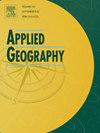Impact of environment in built-up areas on depressive mood: Evidence from China
IF 4
2区 地球科学
Q1 GEOGRAPHY
引用次数: 0
Abstract
The environment in built-up areas has a significant impact on mental health, but the extent of this impact needs to be further quantified. This study is a pioneering article that, from a macro perspective, utilized internet big data platform to obtain continuous data for various cities from 2015 to 2021, and investigated mental health issues at the prefecture-level city scale. This study explored spatiotemporal distribution of depression through GIS analysis methods and impact of environmental indicators in built-up areas on depression through panel regression analysis. The results showed that (1) the areas with a high depression index were mainly concentrated in the eastern region and some first-tier cities in other regions. (2) The depression index increased gradually over time. (3) The effects of gross regional product (GRP), number of students enrolment in regular secondary schools, tertiary industry as percentage to GRP, loans of national banking system, and number of subscribers of Internet services were relatively stable, and the growth of these indicators led to an increase in the depression index. Based on these results, future urban development should adopt region-specific measures to address people's mental health issues and ensure that economic development is accompanied by a focus on mental well-being.
求助全文
约1分钟内获得全文
求助全文
来源期刊

Applied Geography
GEOGRAPHY-
CiteScore
8.00
自引率
2.00%
发文量
134
期刊介绍:
Applied Geography is a journal devoted to the publication of research which utilizes geographic approaches (human, physical, nature-society and GIScience) to resolve human problems that have a spatial dimension. These problems may be related to the assessment, management and allocation of the world physical and/or human resources. The underlying rationale of the journal is that only through a clear understanding of the relevant societal, physical, and coupled natural-humans systems can we resolve such problems. Papers are invited on any theme involving the application of geographical theory and methodology in the resolution of human problems.
 求助内容:
求助内容: 应助结果提醒方式:
应助结果提醒方式:


